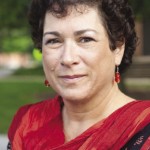Four CJP faculty members were asked to comment on the poor prognoses for their region offered by some CJP alumni working for peace in the Middle East.

Barry Hart, PhD, professor of trauma, identity and conflict studies, pointed to recent neuroscience suggesting that humans have an innate desire to bond and empathize with one another. Framed in different terms, pervasive physical and structural violence is at odds with our own biology, and therefore will someday, somehow, come to an end. “You feel that in your bones,” says Hart. “That gives you not only hope, but strength and patience to go forward.”
Though often used interchangeably, hope and optimism represent different concepts, says David Brubaker, PhD, associate professor of organizational studies. Optimism, or lack thereof, is short-term, pragmatic and based on specific facts. Hope, though, looks above and beyond specific facts; it is rooted in an idea often referenced by Martin Luther King, Jr. – that the “arc of the moral universe is long, but it bends toward justice.”

The distinction is an important one for peacebuilders working in challenging environments that don’t justify an expectation that things are soon to get better.
“Optimism is often not warranted in our work with intractable conflict, but hope is something that has to be sustained,” Brubaker says.
At the same time, it is important to acknowledge the reality of despair and disillusionment that often accompanies peacebuilding work.
“We do the field of peacebuilding a disservice if we only cast our work within a utopian future vision,” says Carl Stauffer, PhD, assistant professor of development and justice studies.
There are no quick fixes in “deeply complex, nuanced and layered” conflicts like those faced by alumni in the Middle East, he continues, although that should not be mistaken for ineffectiveness. Doctors are still valuable, Stauffer notes, despite the fact they have yet to eliminate disease. While he also finds hope in the idea that seemingly impossible conflicts will be resolved – the end of apartheid in South Africa being one example – he says that peacebuilders should not be afraid to acknowledge and discuss “discouragement or despondency among practitioners in a tough place like the Middle East.”
Better networking among CJP and its alumni working in challenging environments was identified both by alumni interviewed for Peacebuilder and CJP faculty as one way to address the discouragement they sometimes face. In its new strategic plan completed in the spring of 2012, CJP sets forth developing new programs to strengthen alumni networking for this very reason.

To Jayne Docherty, PhD, professor of leadership and public policy, the shifting dynamics of conflict in the Middle East and the combination of hope and despair these elicit from alumni, also present CJP with an opportunity to evaluate its own role in peacebuilding.
“When the world changes around them, peacebuilders need to hold hope, practice humility and revise their practices,” she says. “What are we at CJP and in the U.S. peace community doing differently in response to the new realities in the Middle East? Have we examined our premises and our assumptions? Or, are we still promoting old practices [like] dialogue or taking the side of the oppressed? What can we learn from our graduates?” — AKJ
